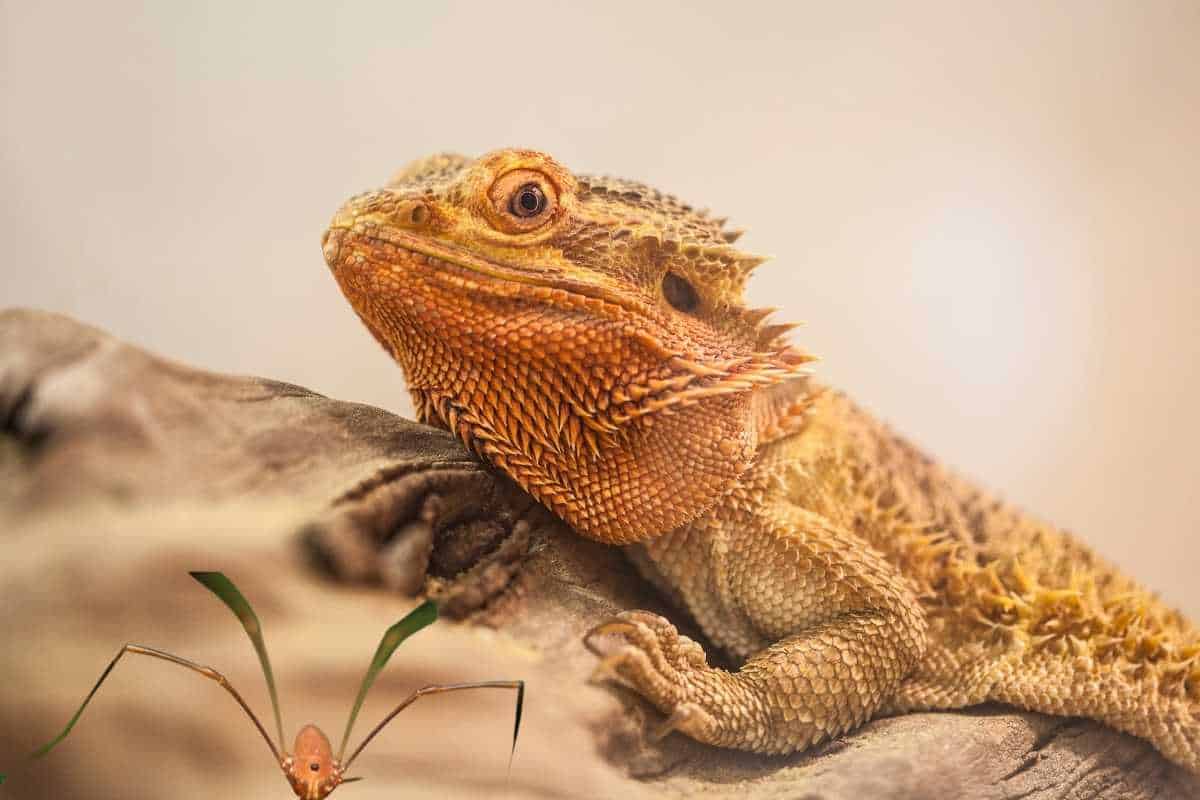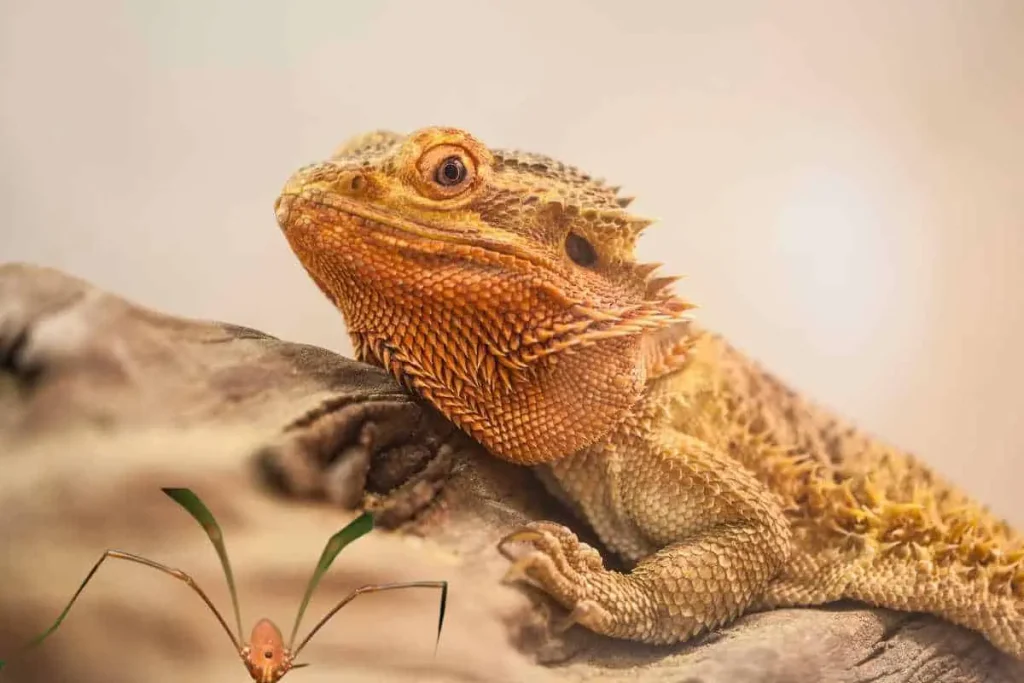Bearded dragons are fascinating creatures that require a balanced diet to thrive. As a responsible pet owner, you must provide them with a variety of nutritious foods to keep them healthy. But what about daddy long legs? Can bearded dragons eat them, or should they be avoided? In this article, we’ll explore the answer to this question and provide some insights into the nutritional needs of bearded dragons. So, let’s dive in and find out more!

Can Bearded Dragons Eat Daddy Long Legs?
Are you a proud owner of a bearded dragon and wondering whether feeding them daddy long legs is a good idea? Daddy long legs, also known as harvestmen, are a common sight in many households. While they may seem like an easy and accessible source of food for your pet, there are certain things you should consider before adding them to your bearded dragon’s diet.
What are Daddy Long Legs?
Daddy long legs are arachnids that belong to the order Opiliones. They are often confused with spiders due to their eight long legs, but they are not true spiders. These creatures are found in many parts of the world, and they have a unique defense mechanism – they can detach their legs when threatened, which can help them escape predators.
Nutritional Value of Daddy Long Legs
When it comes to feeding your bearded dragon, it’s important to provide them with a well-balanced diet that meets their nutritional needs. Daddy long legs may be a source of protein, but they do not offer much in terms of nutrition. They are mostly made up of chitin, which is a tough, indigestible material that makes up the exoskeletons of arthropods.
Potential Risks of Feeding Daddy Long Legs to Bearded Dragons
While daddy long legs may be harmless to humans, they can pose a risk to your bearded dragon. These creatures may carry parasites or bacteria that can cause infections in your pet. Additionally, the exoskeleton of daddy long legs is hard to digest and can cause impaction in your bearded dragon’s digestive system.
Alternatives to Feeding Daddy Long Legs to Bearded Dragons
If you’re looking for a protein source for your bearded dragon, there are many safer options available. Dubia roaches, crickets, and mealworms are all great options that offer more nutritional value than daddy long legs. These insects are also easier to digest and less likely to cause impaction.
Conclusion
In conclusion, while daddy long legs may seem like an easy and accessible source of food for your bearded dragon, they are not the best option. These creatures offer very little in terms of nutrition and can pose a risk to your pet’s health. It’s important to provide your bearded dragon with a well-balanced diet that meets their nutritional needs. If you’re looking for a protein source, there are many safer options available that offer more nutritional value.
Frequently Asked Questions
Bearded dragon owners often wonder if their pets can eat daddy long legs. Here are some frequently asked questions about this topic.
Can bearded dragons eat daddy long legs?
Daddy long legs are not toxic or dangerous to bearded dragons, but it is not recommended to feed them to your pet. This is because they do not provide any nutritional value and can cause digestive problems.
Bearded dragons require a balanced diet of vegetables, fruits, and insects. Feeding your pet a varied diet will ensure they receive all the necessary nutrients and vitamins they need to stay healthy.
What happens if my bearded dragon eats a daddy long legs?
If your bearded dragon accidentally eats a daddy long legs, it should not cause any harm. However, if your pet consumes a large number of them, it can cause digestive problems such as constipation or impaction. In severe cases, this can lead to serious health issues.
It is important to monitor your bearded dragon’s diet and ensure they are only consuming foods that are safe and nutritious for them. If you notice any signs of digestive issues, such as bloating or lack of appetite, contact your veterinarian immediately.
Are there any other insects that bearded dragons should avoid eating?
Yes, there are several insects that bearded dragons should not eat. These include fireflies, boxelder bugs, and lightning bugs. These insects contain toxins that can be harmful or fatal to your pet.
It is important to research each type of insect before feeding it to your bearded dragon. Additionally, it is recommended to only feed your pet insects that are bred specifically for reptile consumption, as wild-caught insects may contain harmful pesticides or parasites.
How often should I feed my bearded dragon?
The frequency of feeding your bearded dragon will depend on their age and size. Juvenile dragons should be fed more frequently than adults. A general rule of thumb is to feed your pet once or twice a day, offering a variety of vegetables, fruits, and insects.
It is important to monitor your bearded dragon’s weight and adjust their diet accordingly. Overfeeding can lead to obesity and health problems, while underfeeding can cause malnutrition. Consult with your veterinarian to determine the best feeding schedule for your pet.
Can bearded dragons eat fruits and vegetables?
Yes, bearded dragons can eat a variety of fruits and vegetables. Some good options include kale, collard greens, squash, sweet potato, blueberries, and mango. It is important to offer a diverse range of fruits and vegetables to ensure your pet receives all the necessary nutrients and vitamins.
However, not all fruits and vegetables are safe for bearded dragons. Avoid feeding your pet any citrus fruits, rhubarb, or avocado, as these can be toxic to reptiles. Additionally, it is important to wash all produce thoroughly before feeding it to your pet.
Beardi the bearded dragon gobbled daddy long legs
In conclusion, while daddy long legs may be a tempting snack for your bearded dragon, it is not recommended to feed them these insects. Daddy long legs are not a natural part of their diet and may contain harmful toxins that can be harmful to your pet’s health. It is always best to stick to a diet of commercially available insects and vegetables that are safe and nutritious for your bearded dragon.
If you notice your bearded dragon has accidentally ingested a daddy long legs, monitor their behavior closely and contact a veterinarian if you notice any signs of illness or distress. Prevention is always the best course of action, so be sure to keep any potential harmful insects or other items out of your pet’s reach.
Ultimately, as a responsible pet owner, it is important to prioritize the health and well-being of your bearded dragon above all else. By providing a balanced diet and taking precautions to avoid potential hazards, you can ensure that your beloved pet remains happy and healthy for years to come.


